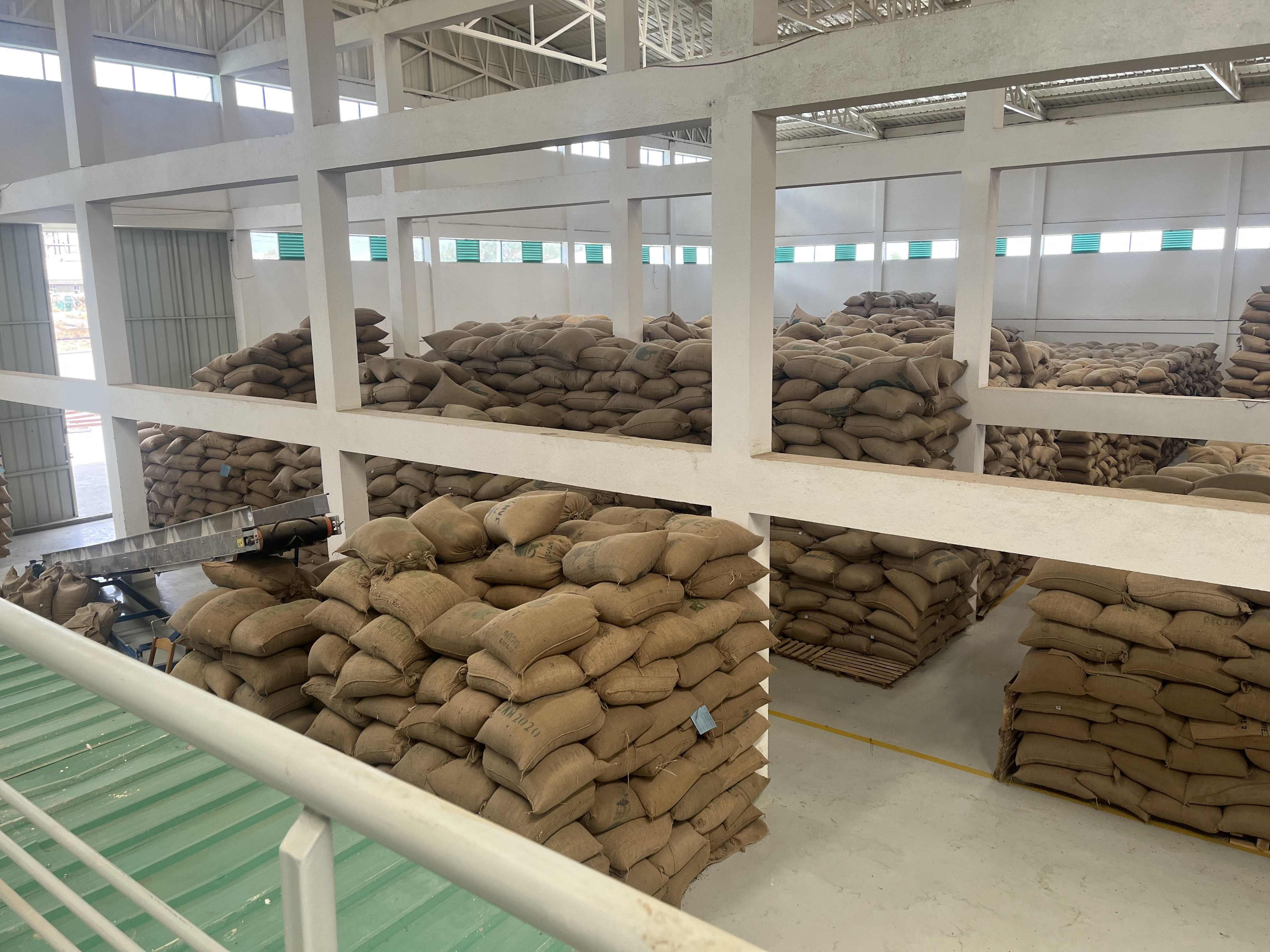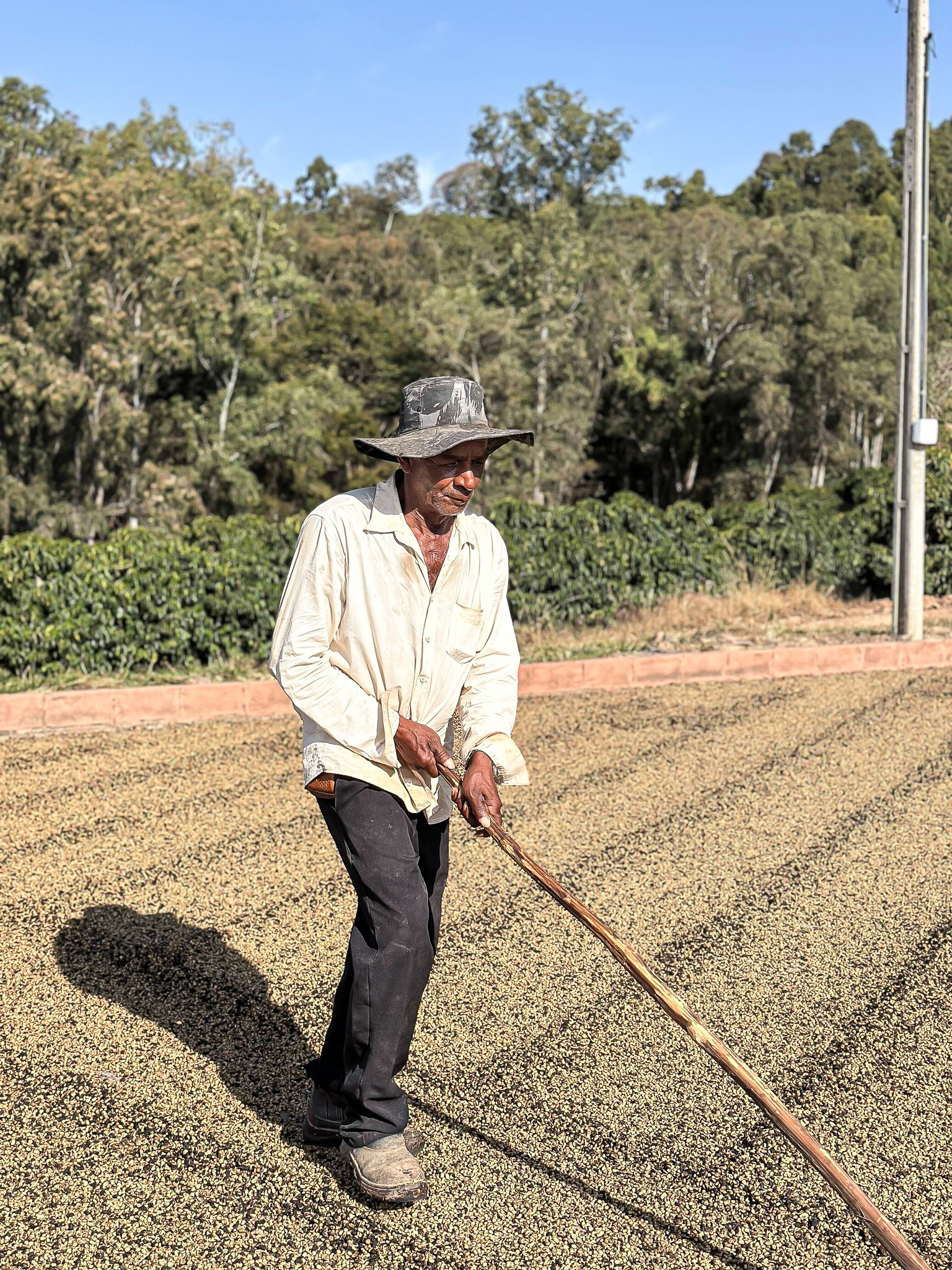Colombia

A wide range of concept coffees, microlots, & traceable blends.
Ever since we started sourcing from Colombia in 2014, we have focused on building relationships and integrating quality control into our buying. We have created a series of distinct and traceable coffees, which we call "concepts", focusing on both microlots and value-added communal lots. With direct presence at origin, we partner with producer groups, cooperatives, and specialty-focused exporters in Huila, Tolima, Nariño, and Antioquia through buying programs that prioritise consistent, high-quality coffee.
Harvesting season
Antioquia main harvest: Oct - Jan, Central Huila: Jun - Nov, Southern Huila: Sept - Jan, Nariño: May - Sep
Arrival times
December – February & September - November
Quantities
3 – 100 bag lots. Average lot size is around 10 bags.
Packaging
24 – 30 kg vacuum boxes & 70 kg grain pro bags
Cultivars
Mostly Caturra, Castillo, & Variedad Colombia, but also Tabi, Bourbon, & Typica.
Processes
Mainly washed, but we work with producers to produce some naturals & honeys.
Flavour profiles
Generally very complex, rich and fruit-driven with florals, berries, mature plum, grapes, blackberry, currants, stone fruit and citrus.
Usage
Can be used for everything from complex filter brews to rich, sweet and creamy espressos.
Shelf life
Normally holds up well for around 9 months. We can never guarantee more than 6 months after arrival for any coffees.
To ensure distinct and traceable coffees, we work with producer groups, cooperatives, and specialty-focused exporters in ongoing buying programs that concentrate on consistent, high-quality coffee. Farmers selected for our programs often deliver very small volumes at a time. The coffees that meet the target moisture levels, yield factor, and quality are kept separate and cupped individually. If we and the local cuppers score the coffees at a higher level, they are approved for purchase.
Colombia's diverse micro-climates and soil conditions are ideal for producing exceptional coffee, but most farmers have insufficient resources and limited access to the specialty market. The National Federation of Coffee Growers (FNC) has a purchase guarantee program with buying stations set up all over the country. Farmers can sell their coffee to the FNC any day of the year, for a price that is widely published. This is a great safety net for farmers, but it can also lead to exceptional coffees disappearing into larger regional blends.
We source from Huila, Tolima, and Nariño, as well as Antioquia, through a partnership with pioneer Juan Saldarriaga. We don't just select the top scoring coffees; rather, we build relationships with our partners for ongoing support and development.
Our approach is to develop relationships and integrate quality programs into our buying, creating "projects" or "concepts" that focus on microlots and larger blends. Our concept coffees fall under names like Recolectores, Fruta Madura, Madremonte, El Divino Niño, and Bomba de Fruta. You’ll also find plenty of coffees produced by Juan Saldarriaga, the driving force behind our Antioquia selection.

A step-by-step overview

In Colombia, Caturra is generally known for having the best flavour attributes if farmers are able to do everything right throughout all stages of the production cycle. That said, we have seen a lot of amazing cups with the Colombia and Castillo varieties as well.
If they are well treated by the producer, and picked when they are extremely ripe, meaning a very deep red to purple colour, they lose the common herbal and astringent flavours associated with these varieties, and become super sweet and complex. Most farmers will have a mix of 1-3 of these cultivars, which helps maintain diversity and mitigate the risk of disease and infestation.
Finding pickers is a constant challenge that has only worsened since the Covid-19 pandemic. Cherries are picked in three to four passes. The producers and pickers collect the ripe cherries in one block, then wait until there the remaining cherries begin ripening before doing another pass. Incentivising workers to only pick ripe cherries can be challenging, as their payments are usually based on volume, and the work is harder.
If a producer wants exceptional quality, they often have to follow the process very closely, or hand sort the cherries after picking, before they begin processing. Generally, the first and last passes produce lower quality. The second and third are considered to be the best, with more ripe cherries and uniform quality. When we can, we try to buy parchment harvested in the second and third passes. The climate in Colombia is always a challenge.
In Huila for example, it can sometimes rain non-stop for weeks during harvesting, fermenting and drying. In Nariño, the opposite can occur, with high temperatures and droughts. The growing conditions and practices can often compensate for that, and result in desirable outcomes.
Coffee in Colombia is a cash crop, meaning you can sell your coffees any day in big or small volumes and get direct payment in cash. Every small town in coffee growing areas will have purchasing points for parchment, called “bodegas”. These are run by local traders who resell to exporters, exporters themselves, growers associations, cooperatives or the FNC. In many cases, they are located in the same place and compete to get coffee from growers.
Most parchment buyers will assess the quality simply by looking at the physical attributes, and pay the producers based on the yield factor. They do not pay attention to individual flavour attributes and they just add the purchased coffee to a pile. Coffees from all the different producers get mixed and sold as a general “excelso” quality coffee from that region. There are exceptions, and these are the local buyers we work with.
We work with groups, exporters or cooperatives who have their own bodegas, and purchase parchment from producers that are part of our buying programs.
Dry fermentation is the most widely used method. The farmer usually has a small ‘beneficio’, a small manual or electric pulper, and a fermentation tank. They pulp the cherries in the afternoon and send the beans directly to the fermentation tank from the pulper. The coffee can sit there for one to two days, depending on the temperature. Higher temperatures will speed up the fermentation process, and lower temperature will slow it down.
Some producers do intermediate rinsing with water, which can also help them control the process. Some producers use the wet fermentation method, meaning they add water to the tank after pulping. Some of Colombia’s best coffees are fermented this way. They change the water several times, which slows down the fermentation time and provides a larger window between properly fermented and over fermented. It also establishes more consistency, as producers can skim off the floaters during the rinse and gather a better selection.
Methods for washing and grading vary widely. Some producers have channels, some don’t. The channels are often short, and they don’t require a huge amount of water. Producers normally stir the coffee in the channels before they remove floaters. Producers without channels will commonly wash the coffees in the fermentation tank, and skim off the floaters before sending the coffee to the drying table.
Smallholders in regions like Huila, Tolima, and Nariño, usually sun-dry their coffees on rooftops or in parabolic dryers that almost work as green houses. There are many different variations and construction types, but all of them can generally protect the coffee from rain. In many places, the climate is inconsistent throughout the day. We see consistently great coffees from producers who have drying systems with good ventilation that allow them to reduce the humidity of the coffee to less than 11% between 10 to 18 days.
In places like Antioquia and Quindio, it is more common to use mechanical dryers. We generally avoid buying coffees that have been dried mechanically, as they have not displayed the best qualities in regard to flavour and shelf-life.
Quality
We believe in uncovering potential where others might not typically look. Amazing coffee isn't limited to Geishas and rare varieties; it's about diving deep into the supply chain and working with farmers who show potential for independent growth.
We collaborate with suppliers that operate their own bodegas, purchasing parchment from farmers in our programs. Our selected farmers often deliver small volumes, and coffees meeting target moisture levels, yield factor, and quality are separated and individually cupped. If approved by local cuppers and us, they move forward for purchase.
We implement strict physical quality control measures, particularly because Colombian coffee is prone to ageing quickly. We enforce strict standards for water activity and moisture content to ensure extended shelf life. Our moisture levels stay below 11.5, lower than the industry average of 12.5. Additionally, our partners are expected to expedite shipping after finalising purchases, ensuring all our coffees reach their destination swiftly.
Caturra is generally recognized for its favourable flavour attributes when the farmers adhere to correct production practices. However, we've discovered exceptional cups with Colombia and Castillo varieties too. When well-treated by the producer and picked at peak ripeness, these varieties lose common herbal and astringent flavours, becoming more sweet and complex. Most farmers maintain a mix of 1-3 cultivars to ensure diversity and minimise the risk of disease and infestation.
Transparency
We collaborate with reliable partners, including producer groups, cooperatives, and exporters with a specialty focus, to create ongoing buying programs. This ensures that our coffees maintain their distinctiveness and traceability back to the producer or producer group.
In Colombia, farmgate prices signify the amount paid for 125 kg of parchment. Our trusted suppliers consistently provide us with the farmgate prices paid to the producers, so that we can ensure we will provide premiums that exceed the actual production costs. We maintain competitive pricing for the farmers in this origin by purchasing coffees for prices well above the market average.
Payment structures vary depending on the supplier. In some cases, the premium paid to farmers is integrated into the FOB payments made to suppliers. Alternatively, in some cooperatives, the initial payment is provided to farmers by the cooperative. Following our coffee contracts, farmers receive an additional payment for the sale.
Impact
Given that many Colombian producers are smallholders, we focus on both microlots and larger blends. The larger blends are designed to offer smaller volume producers entry into the specialty market by creating substantial lots that match in profile or region.
While quality is a focus, our primary emphasis is on building relationships. Our philosophy centres around establishing direct connections with farmers, made possible through having a buyer at origin (we have an office and cupping lab in Bogota).
Through close-knit relationships, we share information, connect with farmers, and gain firsthand insights into production. This allows us to offer realistic expectations, advice, and maintain a clear understanding of the ongoing processes. Transparency toward farmers is crucial in providing them access to the specialty market.
We also witness the growth of their businesses firsthand and see the impact of paying higher premiums year by year. The profitability for farmers is always a priority (the economic aspects of sustainability). With production costs on the rise in Colombia, prioritising economic growth for farmers becomes crucial to sustain specialty production. This approach incentivizes farmers to remain competitive and invest in their production.

About the origin
Farmers in Colombia are typically smallholders, owning around 2-5 hectares of land. Coffees are usually processed at small micro-mills on the farm. Farmers deliver parchment to exporters or cooperatives who cup and grade, dry mill and export green coffee. This is the predominant value chain for the coffees we purchase in Colombia.
There are more than 500.000 coffee producers in Colombia, with around 80% or more owning less than 3 hectares of land. Coffee is grown all over the country and is spread out in 19 regions, most of them along the three mountain ranges coming from the Andes in the South. The biggest and most well-known regions are Antioquia, Huila, Tolima, Cauca, Nariño, Caldas, Santander and Sierra Nevada.
The latitudes range from 2 degrees to about 12 degrees. Altitudes for coffee production can vary from 1200 – 2200 metres above sea level. All producers are picking, pulping, fermenting and drying their coffee themselves in their “micro beneficios”. The coffee is then sold in parchment and delivered to a local town, to a “bodega”. The “bodega” is a purchasing point for parchment and can be represented by a growers association, a cooperative, an exporter, or just an independent local middleman.
Interested in this origin? Talk to your sales rep.




What’s new?
The latest updates delivered to your inbox.
Subscribe to our newsletter for the freshest news on origins, harvests, new producers, our coffee list, and market insight.

.jpg)













.jpg)



.jpg)
.jpg)

